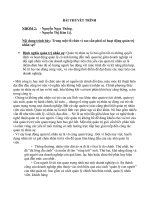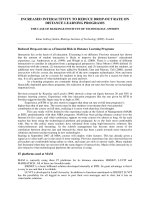Tài liệu Interview Mistakes To Avoid ppt
Bạn đang xem bản rút gọn của tài liệu. Xem và tải ngay bản đầy đủ của tài liệu tại đây (88.08 KB, 2 trang )
13 Interview Mistakes To Avoid
By Leslie Plotkin
The wrong move can cost you the job! You've worked hard to get to the interview stage. You passed
the cover letter and resume screening process...maybe even a few telephone interviews.
Now its time for the face to face interview with the employer itself. Any number of items can go wrong but
you have to be in control and must have confidence. Go into an interview with the feeling that you are
going to impress them so much that they will have to make you an offer.
The interview is the most stressful part of the job hunt for many people because now they can't hide
behind the cover letter and resume. The real face to face human connection between possible employer
and job candidate takes place. But for starters if you simply follow these 13 tips below, you are on your
way to interviews with results.
A big part of a successful interview is avoiding simple mistakes. Mistakes are deadly to the job seeker
and easy to avoid if you are prepared.
These are the most common interview mistakes - and their antidotes.
1. Arriving late. Get directions from the interviewer - or a map. Wear a watch and leave home
early. If the worst happens and you can't make it on time, call the interviewer and arrange to
reschedule.
2. Dressing wrong. You make your greatest impact on the interviewer in the first 17 seconds - an
impression you want to make powerfully positive. Dress right in a conservative suit, subdued
colors, little jewelry (but real gold, or silver, or pearls), low heels (polished) and everything clean
and neat. Hygiene includes combed hair, brushed teeth, deodorant and low-key scent. Check
everything the night before, again before walking out the door and once again in the restroom
just before the interview.
3. Play zombie. OK, you're nervous. But you can still smile, right? And make eye contact, yes? Sit
up, focus on the interviewer, and start responding. Enthusiasm is what the interviewer wants to
see.
4. No smoking, no gum, no drinking. This is all comfort stuff for you, and none of it helps you
here. Employers are more likely to hire non-smokers. At a lunch or dinner interview, others may
order drinks. You best not.
5. Research failure. The interview is not the time for research. Find out the company's products
and services, annual sales, structure and other key information from the Internet, the public
library, professional magazines or from former employees. Show that you are interested in
working for the prospective employer by demonstrating knowledge about the company.
6. Can't articulate your own strengths and weaknesses. Only you can recognize your most
valuable strengths and most hurtful weaknesses. Be able to specify your major strengths. Your
weaknesses, if such must come up, should only be turned around to positives.
7. Winging the interview. Practice! Get a friend, a list of interview questions and a tape recorder
and conduct an interview rehearsal. Include a presentation or demonstration if that will be part of
the real interview. Start with introducing yourself and go all through an interview to saying good-
bye. Write out any answers you have difficulty with, and practice until your delivery is smooth (but
not slick).
8. Talk, Talk, Talk. Rambling, interrupting the interviewer and answering to a simple question with
a fifteen-minute reply - all of these can be avoided if you've thought through and practiced what
you want to communicate. Good answers are to the point and usually shorter.
9. Failure to connect yourself to the job offered. The job description details the company's
needs - you connect your experiences, your talents and your strengths to the description. It
answers the essential reasons for the interview - "How my
education/experience/talents/strengths fit your needs and why I can do this job for you."
10. Not asking questions - and asking too many. Use your research to develop a set of questions
that will tell you whether this is the job and the company for you. This will help you limit and focus
your questions. But don't overpower the interviewer with questions about details that really won't
count in the long run.
11. Bad-mouth anyone. Not just your present employer, or former employer, or the competition.
You don't want to look like a complainer.
12. Asking about compensation and /or benefits too soon. Wait for the interviewer to bring up
these issues - after the discussion of your qualifications and the company's needs and wants.
13. Failure to ask for the job. When the interviewer indicates the interview is over, convey your
interest in the job and ask what the next step is.









